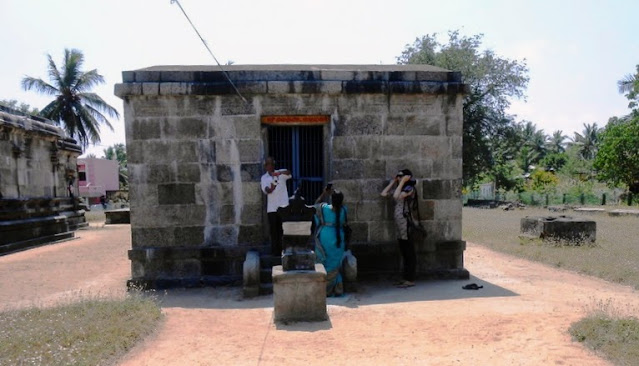Moolavar : Sri Thirupuliswarar
Consort : Sri
Angayarkanni
&
Moolavar : Sri Vaikunteswar / Vaikuntanatha Swamy
Some of the salient features of this temple are…
The temple faces east with a Rajagopuram base without a superstructure. The temple complex consists of Tirupuliswar sannidhi,
Vinayagar, Sri Vaikuntanatha Swamy / Vaikunteswar, and Angayarkanni.
Sri Thirupuliswar Temple
The temple faces east with Balipeedam and Rishabam. A platform is in front of the temple. In koshtam Vinayagar, Guru Bhagavan (Dakshinamurthy),
Vishnu (in Lingothbavar place), Brahma, and Durgai.
Sri Vaikunteswar / Vaikuntanatha Swamy Temple
The temple is rectangular in shape on an elevated level of
about 2 feet from the ground level. Garudan is in front of the sanctum
sanctorum. There are no images in the Koshta niches. Moolavar is with Sridevi and Bhudevi.
ARCHITECTURE
The temple consists of Sanctum sanctorum, antarala, ardha mandapam
and a maha mandapam. The Sanctum
Sanctorum was built in Gajaprishta style on a pada bandha adhistanam with
jagathy, three patta kumudam, and pattikai. The Bhitti starts with vedikai. The
pilasters are of Brahma kantha pilasters with kalasam, kudam, mandi, palakai
amd vettu pothyal. The prastaram consists of simple valapi and kapotam with nasis
and vyyalavari. There is no superstructure found on the Bhumidesam.
HISTORY AND INSCRIPTIONS
This
temple was originally built with bricks during Pallava’s period and the same
was converted to KaRRali during Chozha’s period. ( Pallava Inscriptions, Select
Inscriptions of Tamil Nadu, SII –
Volume XII, no 26, ARE 1908, Nos 362-368 & Tholliyal Nokkil
Kanchipuram, by S Krishnamurthy ).
The Pallava King Rajasimhan alias Narasimha Varman-II’s ( 695
– 725 CE ), Pallava grantha inscription on a Pillar at the entrance records the
ancestors of Pallava Kings. This inscription purports to give the
genealogy of Pallava Kings from Brahma
down fifty-four generations to King Rajasimha ( Both mythological from Brahma
to Asvattama and the 41 Historical names ). The last two verses of the
inscription suggest that it was intended to perpetuate the accession of
Rajasimha ( Narasimha – II ) to the throne. The inscription also suggests that
the pillar might have been brought from a dilapidated structural temple in the
vicinity of this place.
First, the genealogy of the Pallavas from Brahma to
Paramesvaravarman the fathers and the immediate predecessor of Rajasimha is
traced through, Angiras, Brhaspati, Samyu, Bharadvaja, Drona, Asvatthaman,
Pallava, Asoka, Harigupta, Bhutadatta, Suryavarman, .... Visnugopa, Dhrtaka,
Kalinda, Jyamalla, Ripumalla, Vimala, Konkani, Kalabhartri,
Cutapallava, Virakurca, Candravarman, Karala, Visnugopa, Skandamula, Kanagopal
Virakurca, Skandavarman, Kumaravisnu, Buddhavarman, Skandavarman, Kuméaravisnu,
Buddhavarman, Skandavarman, Visnugopa Visnudasa, Skandarvarman, Simhavarman,
Viravarman, Skandavarman, Simhavarman, Skandavarman, Nandivarman, Simhavarman,
Simhavarman, Visnugopa, Simhavarman, Simhavisnu, Mahendravarman,
Narasimhavarman, and Mahendravarman.
Then follows the eulogy of King Rajasimha, born in the
Pallava family. He is given the birudas / titles, Ksatrasimha, Yuddharjuna,
Narendrasimha, Atyantakama, Srimegha, Mahamalla, Ranajaya, and Srinidhi. His
crown is said to have been resplendent with the crest jewel, viz., Mdahésvara.
It is wished, that this king may exercise the royal prerogative and take up the
vow of administering his subjects up to the extremities of his kingdom, as even
to include the dvipa-/aksam.
கோயிலின்
நுழைவாயிலின் வலது பக்க தூணில் கி.பி 695-725 க்கு இடையில் ஆண்ட ராஜசிம்மன் பல்லவன்
இரண்டாம் நரசிம்மவர்மன் பற்றிய கல்வெட்டு உள்ளது. பல்லவர்களின் வம்சாவளியைச் சேர்ந்த 54 மன்னர்களின் பெயர்களும்
இதில் உள்ளன. இதில்
ஆச்சரியம் என்னவென்றால், முதல் ஏழு பெயர்கள் பிரம்மா, போன்ற இந்து கடவுள் பெயர்களுடன்
தொடங்குகின்றன, மீதமுள்ள 47 பல்லவ ஆட்சியாளர்களின் பெயர்கள். இதில், கடைசி ஏழு பெயர்கள் - விஷ்ணுகோபன்,
சிம்மவர்மன், சிம்ம விஷ்ணு, மகேந்திரவர்மன், நரசிம்மவர்மன், மகேந்திரவர்மன் II, பரமேசுவர்மன்,
- வரலாற்று முக்கியத்துவம் வாய்ந்த மன்னர்கள். கடைசி
இரண்டு வரிகளில் ராஜசிம்மன் பல்லவன் பெயர் பொறிக்கப்பட்டுள்ளது.
Rashtrakuda King Kannaradevan’s inscription starts
with his title as Kanchiyum Thanjaiyum Konda ( Victory over Kanchipuram and
Thanjavur ). This inscription records the sale of land.
Rajaraja Chozha-I’s ( 997 CE ) inscription records
the endowment of burning perpetual lamps and the donations made for the same.
The temple was completely reconstructed as a stone
temple with the original Gajaprishta style by Kulothunga Chozha –I’s period.
The inscriptions record Shiva’s name as Mahadevan,
Thirupilavayiludaya Nayanar ( Since this place is situated on the seashore –
pilavayil ). During the Vijayanagara period, this place was called Pattina Nadu,
Jananatha Nallur.
The Pandya King Sundayara Pandyan’s inscription (
1264 CE ) records that the temple lands / Thevadhana lands are barred to
sell or leased.
The Vijayanagara King Bukkaraya’s ( 1385 CE )
period inscription records the levy of tax of 3 panam / thari / handloom.
The 1427 CE inscription records the gift of lands
belonging to Arampakkam to this temple.
Vijayanagara King Rayar Bommaiya Devamaharaj’s
period ( 1505 CE ) inscription records a gift of land to this temple for worship, by
Thimmarajan. ( ARE 1908, Nos 362-368 ).
This temple is under the control of ASI (Archaeological
Survey of India).
TEMPLE TIMINGS
The temple will be kept open between 07.00 hrs to 11.00
hrs and 17.00 hrs to 20.00 hrs.
CONTACT DETAILS
The Gurukkal’s mobile number is +91 89391 33769 may be
contacted for further details.
HOW TO
REACH
This Temple at Vayalur is about 1.6 KM from
Sadurangapattinam, 3.5 KM from Kalpakkam bus stand, 20 KM from Mamallapuram and
Thirukalukkundram, 40 KM from Chengalpattu and 75 KM from Chennai Central
station.
Nearest railway Station is Chengalpattu.













.jpg)







No comments:
Post a Comment